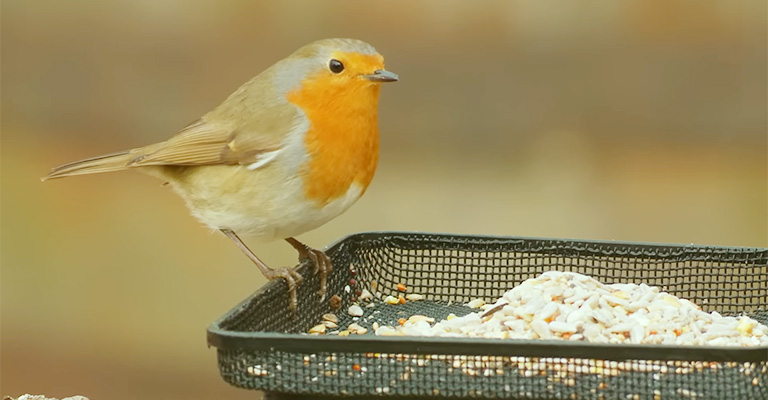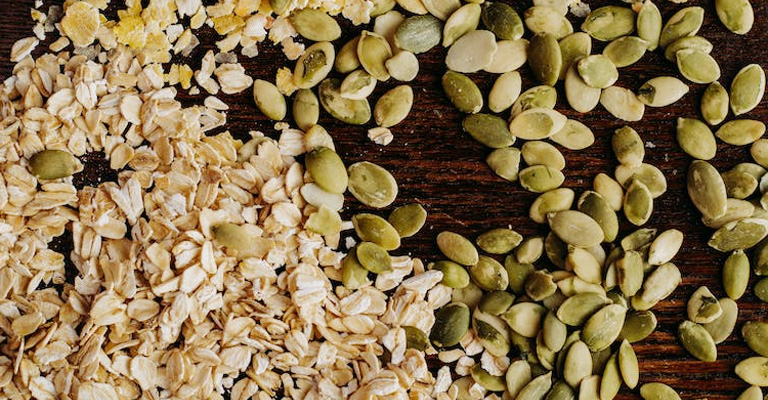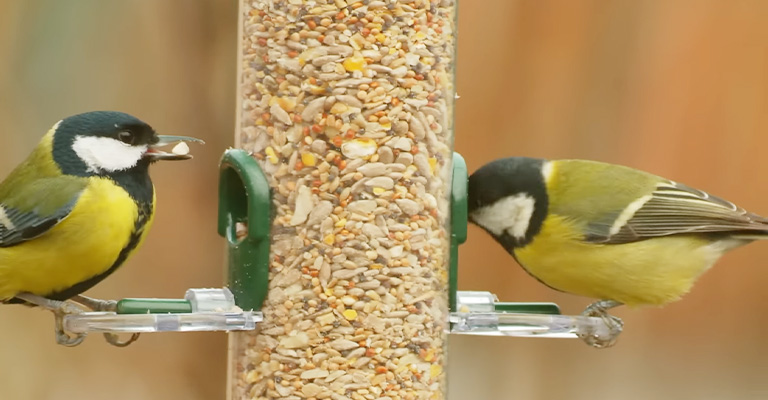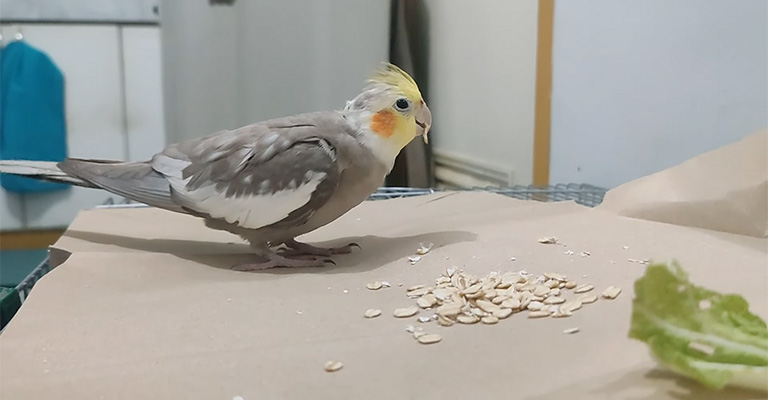The dietary preferences of birds are as diverse as the avian species themselves, leading many to wonder about the suitability of oats in their diets. Oats, a staple in human nutrition, have found their way into the feeding routines of many backyard bird enthusiasts.
The question of Can Birds Eat Oats and, more importantly, whether it benefits them is a topic of interest for birdwatchers, nature lovers, and those committed to responsible feeding practices.
In this exploration, we delve into the world of avian diets, focusing on the feasibility of oats as a food source for birds.
We will uncover which bird species are most likely to consume oats, the nutritional advantages they offer, and the best ways to present oats to our feathered friends.
Understanding the compatibility of oats with birds’ dietary needs is essential for creating bird-friendly environments and promoting their well-being.

Can Birds Eat Oats?
Here are some benefits and descriptions based on the web search results:
Energy
Oats provide birds with energy, as they are rich in carbohydrates and calories. Oats can help birds to maintain their activity levels and cope with cold weather. Oats can also be stored by birds for later use, such as during winter or migration.
Protein
Oats provide birds with protein, which is essential for their growth, development, and repair of tissues.
Protein also helps birds to produce feathers, eggs, and hormones. Oats contain a high amount of lysine, an amino acid that is often lacking in other grains.
Fiber
Oats provide birds with fiber, which helps to regulate their digestion and prevent constipation.
Fiber also helps birds to feel full and reduce their appetite, which can prevent overeating and obesity. Oats contain both soluble and insoluble fiber, which have different benefits for the bird’s health.
Vitamins
Oats provide birds with vitamins, which are important for their metabolism, immunity, and nervous system.
Some of the vitamins that oats contain are vitamin B1, vitamin B2, vitamin B3, vitamin B5, vitamin B6, vitamin B9, vitamin E, and vitamin K.
Minerals
Oats provide birds with minerals, which are essential for their bones, muscles, blood, and enzymes.
Some of the minerals that oats contain are calcium, phosphorus, magnesium, iron, zinc, copper, manganese, selenium, and iodine.
Antioxidants

Oats provide birds with antioxidants, which help to protect their cells from oxidative stress and inflammation.
Antioxidants also help to prevent or reduce the damage caused by free radicals, which are harmful molecules that can cause aging, disease, and cancer in birds.
Oats contain a variety of antioxidants, such as phenolic compounds, flavonoids, tocopherols, and avenanthramides.
Beta-glucan
Oats provide birds with beta-glucan, which is a type of soluble fiber that has many health benefits.
Beta-glucan can help to lower the bird’s cholesterol levels and improve their heart health. Beta-glucan can also help to boost the bird’s immune system and fight against infections and diseases.
Oat Oil
Oats provide birds with oat oil, which is a type of fat that has beneficial properties. Oat oil can help to moisturize the bird’s skin and feathers and improve their appearance and condition.
Oat oil can also help to reduce inflammation and itching in the bird’s skin and prevent skin infections and parasites.
Oat Groats
Oats provide birds with oat groats, which are the whole kernels of oats that have been hulled but not processed.
Oat groats are the most nutritious part of oats, as they contain all the nutrients mentioned above in their natural form. Oat groats can also provide birds with a crunchy texture and a nutty flavor that they may enjoy.
Which Oats Are Better For Birds?

Birds can benefit from various types of oats, and the choice largely depends on the specific preferences of the bird species you are trying to attract.
Here are some kinds of oats commonly used for feeding birds:
Whole Oats
Whole oats, often referred to as “rolled oats,” are a nutritious choice for many bird species.
These oats are minimally processed and retain their natural nutritional value. Birds like jays, pigeons, and quail typically enjoy whole oats, which provide essential energy in the form of carbohydrates.
Steel-Cut Oats
Steel-cut oats are whole oat groats that have been chopped into small pieces. They are a bit coarser than rolled oats and can be particularly appealing to ground-feeding birds like sparrows, doves, and towhees.
These oats are a good source of energy and nutrients.
Instant Oats
Instant oats are pre-cooked and processed oats that have been flattened and cut into smaller pieces for quick cooking.
While they are suitable for human consumption, they may not be the best choice for birds.
The high processing level and added flavorings may not align with birds’ natural diets, so it’s best to opt for less processed options when feeding them.
Oat Groats
Oat groats are whole, hulled oat grains. They are an excellent source of nutrition and can attract a variety of birds, including doves, quail, and larger species like turkeys and pheasants.
Oat groats provide essential energy and are often used in birdseed mixes.
Oatmeal or Porridge
Plain, cooked oatmeal without any added sugar or flavorings can be offered to birds, especially during cold weather.
It provides warmth and energy, making it a favorite for many backyard birds like cardinals, bluebirds, and sparrows.
When offering oats to birds, it’s essential to provide them with a clean and dry feeder. Avoid flavored or processed oats with additives like sugar and salt, as these can be harmful to birds.
Additionally, oats should be part of a balanced diet that includes a variety of other seeds, fruits, and insects to meet the diverse nutritional needs of different bird species.
Which Bird Can Eat Oats?

Many bird species can eat oats, and they are a valuable source of energy and nutrients, especially during the colder months.
Here are some bird species that commonly consume oats:
House Sparrow (Passer domesticus)
House sparrows are familiar visitors to bird feeders and readily consume oats. These small, adaptable birds appreciate the energy oats provide, making them a staple in many bird feeding stations.
American Goldfinch (Spinus tristis)
Goldfinches are seed-eating birds that enjoy oats, particularly in the winter months. Offering oats in a platform or tube feeder can attract them to your backyard.
Dark-Eyed Junco (Junco hyemalis)
These ground-feeding sparrows are often seen foraging for seeds, including oats, on the ground. They are frequent visitors to bird feeders during the winter.
Northern Cardinal (Cardinalis cardinalis)
Cardinals are known for their bright red plumage, and they appreciate a varied diet that includes oats. They can be attracted to your yard with a mix that includes oats.
Mourning Dove (Zenaida macroura)
Mourning doves are ground-feeding birds that readily consume oats, especially if scattered on the ground beneath feeders.
American Tree Sparrow (Spizella arborea)
During the winter, American tree sparrows often feed on a mix of seeds, including oats. They are commonly found in the northern regions of the United States.
European Starling (Sturnus vulgaris)
Starlings are omnivorous birds that will eat a wide range of foods, including oats if offered. They are known for their iridescent plumage and are often seen in urban and suburban areas.
Common Grackle (Quiscalus quiscula)
Grackles are opportunistic feeders and will consume oats along with other grains and seeds. They are commonly found in North America and can be attracted to feeders with oat offerings.
Wild Turkey (Meleagris gallopavo)
Wild turkeys are larger birds that enjoy a diet rich in grains, including oats. They are often spotted in wooded areas and open fields.
Offering oats to these and other bird species can provide essential energy, especially during the winter when natural food sources may be scarce.
Whether provided as whole oats, oat groats, or mixed into birdseed blends, oats are a valuable addition to a well-rounded bird-feeding strategy.
FAQ
No, not all bird species consume oats. Some birds, like sparrows, finches, doves, and turkeys, are more likely to eat oats, while others may not show interest.
Yes, oats are a nutritious source of energy, providing carbohydrates and essential nutrients for birds, especially during the winter when food sources may be scarce.
You can scatter oats on the ground for ground-feeding birds or provide them in feeders mixed with other seeds. Ensure they are plain, unprocessed oats without additives.
No, flavored or sweetened oats with additives like sugar and salt are not suitable for birds. Plain, unprocessed oats are the best choice to ensure their well-being.
While oats offer valuable nutrition, they should be part of a varied diet. Birds benefit from a mix of seeds, fruits, insects, and other natural foods to meet their diverse dietary needs.
Conclusion
The question of whether birds can eat oats is met with a resounding “yes.” Numerous bird species, from sparrows and finches to doves and turkeys, can and do consume oats as part of their diet.
These grains offer valuable energy in the form of carbohydrates and essential nutrients that help sustain birds, especially during the challenging winter months.
Additionally, avoiding flavored or processed oats with additives like sugar and salt is essential to ensure the birds’ well-being.
By incorporating oats into our bird-feeding practices responsibly, we can enhance the nutritional diversity of our avian visitors’ diets and contribute to their health and vitality.
This, in turn, fosters a deeper connection with the natural world and a greater appreciation for the diverse dietary needs of our feathered companions.